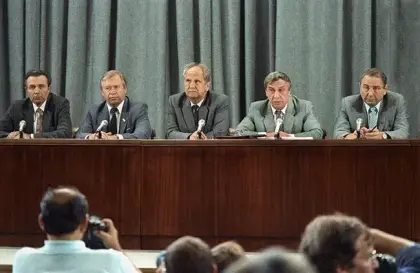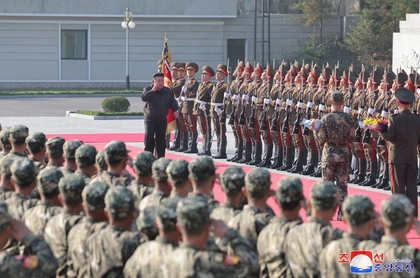Thirty-two years ago, on Aug. 19, 1991, a group of Soviet hardliners sought to turn back the wheel of history. They attempted a putsch in Moscow and for several days the fate of the Soviet Union, and understandably also of the then still Soviet Ukrainianrepublic, hung in the balance.
As we approach the 32nd anniversary of the affirmation of Ukraine’s independence, it is worth recalling what this attempted putsch was all about, what its implications and consequences were, and what role it played in precipitating the dissolution of the Soviet Union and the emergence of an independent Ukraine.
JOIN US ON TELEGRAM
Follow our coverage of the war on the @Kyivpost_official.
The aim of the Communist hardliners was to put the brakes on the process of democratization that had been triggered by Soviet leader Mikhail Gorbachev with his policies of perestroika and glasnost. But, in particular, they wanted to preserve the centrally controlled Soviet empire masquerading as a federation of republics and block his scheme to preserve this unitary state through a new compromise “Union treaty” with the increasingly nationally self-assertive non-Russians.
Tough Soviet rule
By this time, Ukraine, where Soviet rule had remained tougher than in other non-Russian republics, had stirred. Following the example being set in the Baltic republics, an alliance of democratic patriotic forces had coalesced in 1989 in the Rukh movement and was promoting an agenda leading to independence.

North Korean Troops in Ukraine – A Wake-up Call
Moreover, not only had the Soviet Ukrainian parliament affirmed state sovereignty of the republic on July 16, 2020, but also some of its Communist leaders, the so-called “sovereignty Communists” led by Leonid Kravchuk, were standing up to Gorbachev and seeking maximum freedom from Moscow.
But it was far from plain sailing. The Communists were still in power and dominated the Soviet Ukrainian parliament.
[Pull quote: Unexpectedly, and unwittingly, Yeltsin turned out to be both the Russian ally and catalyst that Ukraine’s pro-independence forces… needed at that time.]
Yeltsin as catalyst
In Moscow, the liberal Communist, Boris Yeltsin, broke ranks, adopted a democratic position, and in challenging Gorbachev promoted the state sovereignty of the Russian Federation. Unexpectedly, and unwittingly, Yeltsin turned out to be both the Russian ally and catalyst that Ukraine’s pro-independence forces, and its increasingly nationally minded Communists like Kravchuk, needed at that time.
Let’s recall for the record what had been happening in the previous months as “Soviet Ukraine” was seeking to implement its newly proclaimed sovereignty.
Asserting sovereignty
During the final months of 1990, Ukraine managed to assert its sovereignty by bypassing Moscow and signing several important agreements and declarations directly with other Soviet republics and neighboring states. In September, October and November of that year, Hungary, Poland and the Russian Federation formally recognized Ukrainian sovereignty. Ukraine also adopted a higher profile at the United Nations and applied for direct representation in the Commission on Security and Cooperation in Europe process.
Another indication of its new independent course came in January 1991 when the presidium of the Ukrainian Supreme Soviet publicly condemned the Soviet military crackdown in defiant Lithuania.
Referendum
When Gorbachev stepped up pressure on the republics to sign a new union treaty – by announcing an all-union referendum on the future of the USSR – Kravchuk came up with an ingenious compromise: the Ukrainian parliament decided that Ukraine would conduct its own opinion poll on the same day as the referendum, a poll that would qualify the terms in which Ukraine would agree to remain part of the Soviet Union.
The three regions of western Ukraine also decided to add a third question, polling voters on their attitude towards Ukrainian independence.
In the voting on March 17, 1991, 70.5 percent of the voters (58 percent of those eligible to vote) still supported the preservation of the Union. But this result was offset by the more enthusiastic endorsement (80.2percent of those who voted) of the supplementary proposal which specified that Ukraine would only join a new “union of sovereigns.”
Rejecting Gorbachev
For the record, in Kyiv, a city which had which until recently had seemed thoroughly Russified, the majority rejected Gorbachev’s proposal; and in western Ukraine over 90 percent of the voters supported independence.
Kravchuk interpreted the Ukrainian referendum results as a vote “for the kind of union in which Ukraine would be a sovereign state with full rights, a state that would be a master in its own house.”
At the end of June 1991, the Soviet Ukrainian parliament upset the Soviet leader’s plans by voting to postpone further discussion of the proposed new union treaty until mid-September.
Meanwhile under Kravchuk’s guidance and continuing pressure from Rukh, the work of parliament entered a more constructive phase.
Measures were taken to reorganize and rationalize the state administration, and a concept of a new Ukrainian constitution was agreed upon.
Although conservative Communist deputies still held a majority in the parliament, it formally endorsed the following fundamental democratic principles: a multiparty system, the rule of law, respect for human rights, religious freedom, and guarantees of the rights of national minorities.
Direct elections
In July 1990, parliament also approved the creation of the presidential system with a directly elected president. The Ukrainian government headed at that time by Vitold Fokin embarked on a gradual and cautious transition to a market economy.
This then was the situation in August – with the non-Russian republics pressing hard to maximize their sovereignty, or even, as in the case of the Baltic republics, to break free – when the hardliners decided they had to act and restore control. They did, very clumsily on the eve of day that Gorbachev’s new Union Treaty would be signed.
The attempted putsch suddenly placed in jeopardy everything that had been achieved. Confronted with hardline security officials demanding they support the putschists, Kravchuk and his team temporized. This drew a barrage of criticism from the democratic camp. They were even reminded that Gorbachev was being held under house arrest in Crimea, that is, on the territory of sovereign Ukraine.
Rejecting the putsch
For a few tense days of uncertainty, the building of the Ukrainian Writers’ Union became the center of national opposition to the putsch. Thousands of protesters gathered in the center of Kyiv to say no to the putschists.
At one of them, the Ukrainian poet Dmytro Pavlychko called on the Soviet Ukrainian parliament to assert control over military units stationed in Ukraine and to appeal to the outside world to recognize Ukraine’s independence.
By Aug. 22 Yeltsin, who had mobilized and led public resistance to the putsch in Moscow, had emerged victorious and Gorbachev had returned to the capital. It was only then that Kravchuk finally agreed to convene an extraordinary session of the Ukrainian parliament two days later – on a Saturday.
It was against this background of outrage and relief that the Ukrainian parliament met and, with a shaken Kravchuk presiding over a parliament dominated by demoralized and anxious Communists, went on to proclaim Ukraine’s independence.
Today, Russian imperialists emulating the methods of Hitler are waging a barbaric war on independent Ukraine. Thirty-two years ago, their predecessors failed to get their way, but at that time they were opposed by many Russians too.
Putin’s regime, though it has managed through its despotic and propagandistic methods to secure the support of the majority of the Russian population for its chauvinism and aggression, has also miscalculated.Ukraine, with the support of the West, has fought back for more than nine years, and in this way has heroically reaffirmed its determination to remain an independent, democratic, European state.
An earlier version of this article was published by Kyiv Post on Aug. 20, 2022
The views expressed are the author’s and not necessarily those of Kyiv Post.
You can also highlight the text and press Ctrl + Enter






